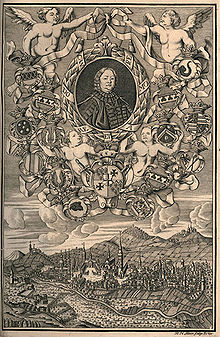Prince-abbot
hideThis article has multiple issues. Please help or discuss these issues on the talk page. (Learn how and when to remove these template messages)
|

| Part of a series on the |
| Hierarchy of the Catholic Church |
|---|
 |
| Ecclesiastical titles (order of precedence) |
|
|
A prince-abbot (German: Fürstabt) is a title for a cleric who is a Prince of the Church (like a Prince-bishop), in the sense of an ex officio temporal lord of a feudal entity, usually a State of the Holy Roman Empire. The territory ruled by a prince-abbey is known as a princely abbey, a prince-abbacy or an abbey principality. The holder, however, does not hold the ecclesiastical office of a Bishop.
The designated abbey may be a community of either monks or nuns. Thus, because of the possibility of it being a female monastery, an abbey-principality is one of the few cases in which the rule can be restricted to female incumbents, styled Princess-Abbess.
In some cases, the holder was a Prince of the Holy Roman Empire (Reichsfürst), with a seat and a direct vote (votum virile) in the Imperial Diet. Most immediate abbots however, while bearing the title of a "Prince-Abbot", only held the status of an Imperial prelate with a collective vote in the Imperial Diet. The Imperial prelates were represented in the Diet by the envoys of the Swabian Circle and the Rhenish College, both holding one collective vote. Actual Prince-Abbots were:
- the Abbot of Fulda, "Archchancellor of the Empress", according to a 1220 decree by Emperor Frederick II, elevated to a Prince-Bishopric by Pope Benedict XIV in 1752
- the Abbot of Prüm, elevated by Emperor Frederick II in 1222, held in personal union by the Archbishop of Trier from 1576
- the Abbot of Kempten, confirmed by King Charles IV in 1348
- the Abbot of Murbach, elevated by King Ferdinand I in 1548
- the Abbot of Stavelot-Malmedy
- the Abbot of Corvey, elevated to a Prince-Bishop in 1792
See also[]
- Prince-Provost
References[]
- Catholic ecclesiastical titles
- Heads of state
- Religious leadership roles
- Princes
- Catholic Church stubs